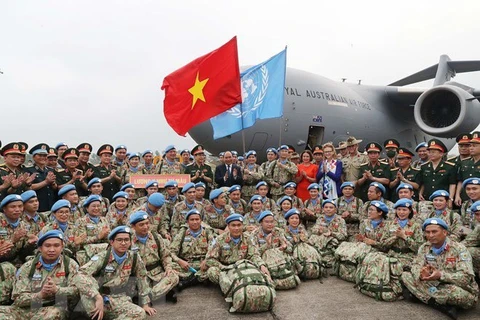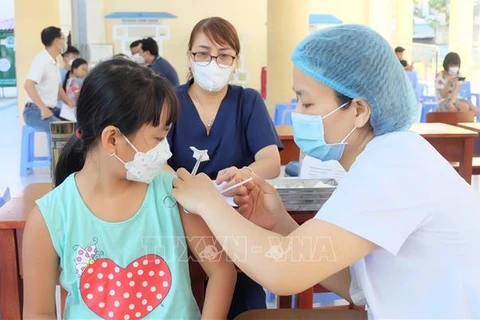 Vietnam officially becomes the 149th member of the United Nations on September 20, 1977 (Photo: VNA)
Vietnam officially becomes the 149th member of the United Nations on September 20, 1977 (Photo: VNA) Hanoi (VNA) – On September 20 this year, Vietnam marked the 45th anniversary of its admission to the United Nations, the world's largest multilateral organisation.
Relations between Vietnam and the UN have continually been consolidated, and the country has made unceasing efforts to become a trustworthy and responsible member of this organisation.
Between 1977 and 1986, Vietnam had to deal simultaneously with the serious consequences of war and reorganise its underdeveloped economy. During that period, the UN actively assisted the country in settling difficulties, with total aid surpassing 500 million USD.
Vietnam implemented the "Doi moi" (renewal) policy between 1986 and 1996. By the late 1980s, the UN's assistance accounted for nearly 60% of total aid for Vietnam, excluding support from socialist countries. During this period, the UN's non-refundable aid topped 630 million USD.
Many members of the Organisation for Economic Cooperation and Development (OECD) and international and regional organisations resumed aid provision for Vietnam in the early 1990s.
However, the UN still made up 30% of the country's external sources of technical assistance.
Cooperation programmes supported the Vietnamese Government considerably in making development policies and improving State agencies and their staff's management capacity. The UN also made valuable contributions to the enhancement of local technical capacity, the development of human resources in science and technology, and the settlement of social issues in the country.
In the 1997-2011 period, implementing the foreign policy of multilateralism and diversifying foreign relations and making friends with all nations, Vietnam made use of the UN forum to strengthen ties with UN organisations and expand bilateral and multilateral relations with other states and international organisations.
During that time, Vietnam fulfilled its role as a non-permanent member of the UN Security Council (UNSC) from 2008 – 2009.
Vietnam actively negotiated and officially became a party to the Chemical Weapons Convention in 1998, took part in the negotiation on and was one of the first signatories of the Comprehensive Nuclear-Test-Ban Treaty in 1996, and became a participant in the Conference on Disarmament the same year.
Vietnam did a good job of attracting assistance from UN organisations and proactively designed new forms of cooperation. The tripartite cooperation model, firstly on rice farming among Vietnam, the Food and Agriculture Organisation (FAO), and Senegal, has been expanded and applied widely and is considered a model for cooperation.
Vietnam has also shown full and substantive participation in the policy-making mechanisms of the UN, as seen in its membership in the UN Economic and Social Council (ECOSOC) for 1998 – 2000.
During this period, the country actively coordinated with development organisations of the UN to carry out the "One UN" initiative on a trial basis, receiving a high evaluation from sponsors.
The pilot implementation of the initiative has helped improve the efficiency and cohesion of UN agencies' offices in the Southeast Asian nation.
On January 1, 2014, Vietnam officially became a member of the Human Rights Council for 2014 – 2016. In June of the same year, it sent the first personnel to UN peacekeeping activities. It served as a member of the ECOSOC for 2016 – 2018.
Vietnam has actively participated in the UN's joint efforts to solve regional and international peace and security issues and promote human rights. Vietnam took part in negotiations and signed the Treaty on the Prohibition of Nuclear Weapons in 2018, becoming the 10th country to do so.
On June 7, 2019, Vietnam, for the second time, was elected a non-permanent member of the United Nations Security Council for the 2020-2021 period, with 192 out of the 193 votes. The landslide vote demonstrated the international community's recognition of the country's active, substantive, and responsible contributions to the UN in general and the UNSC in particular.
Vietnam and the UN completed the joint strategic plan for 2017-2021 within the framework of the One UN Initiative signed in July 2017. The initiative focuses on supporting the Government of Vietnam in implementing the Socio-Economic Development Plan for 2016-2020 and the Sustainable Development Goals (SDGs).
 Prime Minister Pham Minh Chinh speaks at the 26th United Nations Climate Change Conference of the Parties (COP26) held in Scotland in November 2021. (Photo: VNA)
Prime Minister Pham Minh Chinh speaks at the 26th United Nations Climate Change Conference of the Parties (COP26) held in Scotland in November 2021. (Photo: VNA) At the 26th United Nations Climate Change Conference of the Parties (COP26) held in November 2021, Prime Minister Pham Minh Chinh committed to achieving net zero emissions by 2050 and joined the global pledge to reduce methane emissions.
Vietnam has received more than 61.7 million vaccine donations through the COVID-19 Vaccines Global Access (COVAX) Programme and medical supplies worth 45 million USD from United Nations organisations.
Over the past 45 years, the cooperation between Vietnam and the UN has produced good results, meeting the requirements and interests of Vietnam in each period and strengthening the country's role and contribution to the latter.
These achievements will create favourable conditions for their joint efforts to overcome the existing shortcomings and further improve the effectiveness of collaboration between the two sides./.























